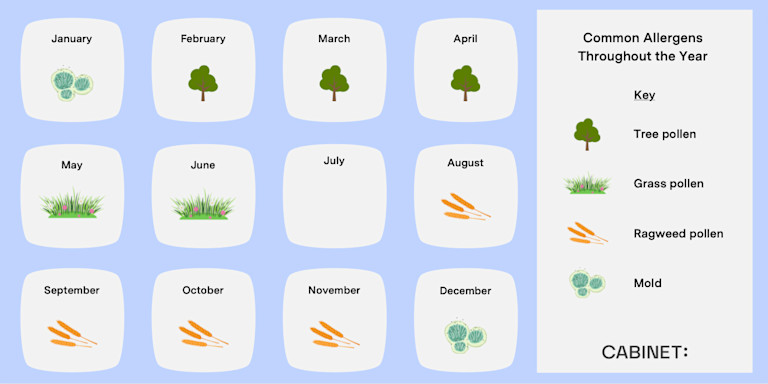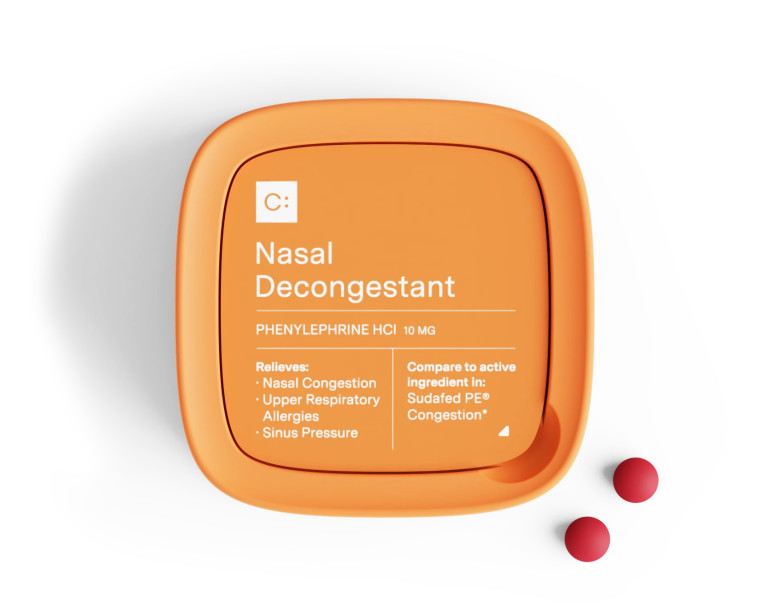When is allergy season?
Most people think spring is allergy season. While spring is a popular time for allergy symptoms to develop, allergy seasons differ in timing and severity across the country. Seasonal allergies may also affect different people at different times of the year.

In general, a year may look something like this:(1)
Spring: February - May
It’s commonly thought that blooming flowers are the cause of spring allergies. However, plants that spread pollen via wind are more likely to be the offenders. Many types of trees are pollinated by wind, and tree pollens are the main allergens during this time of the year
Summer: May - June
Grass pollen is probably the culprit if you experience allergies late spring and early summer.
Summer: July
Allergy season generally takes a break in July.
Fall: August - November
The term “hay fever” was historically used to describe allergy symptoms that farmers experienced when harvesting hay in the fall. It was later found that ragweed pollen, not hay fever, was the actual offender. Allergists commonly consider August 15 to be the beginning of ragweed season.
Winter: December - January
Along with the temperature, you can expect pollen season to also chill out in the winter. Folks in the Midwest may experience allergies caused by mold spores, but most allergy sufferers can take a break during the winter.
What are the symptoms of seasonal allergies?
Some symptoms you may experience during allergy season include:
red, watery, or itchy eyes
itchiness in the nose, mouth, or throat
postnasal drip
sneezing
dry cough
headache
stuffy or runny nose
loss of smell (due to congestion)
Tips to survive allergy season:
1. Rule out other potential causes of your symptoms
Allergies, the common cold, and other viruses can all cause similar symptoms, so sometimes it can be difficult to identify the cause. Generally, allergies may be suspected over a cold if:
you have congestion that persists for weeks
your symptoms increase in response to a trigger (i.e. pollen)
your eyes, nose, and throat feel itchy
If you’re unsure, it’s always recommended to check with your doctor do get a more accurate diagnosis.
2. Use, or don’t use, your windows
If you’re allergic to pollen, keep it out of your home. Avoid leaving the window open during allergy season and use your air conditioner instead.
If you’re allergic to mold, dust, or other indoor allergens, open your windows and let the outside breeze help whisk some allergens away from your home.
3. Rinse your sinuses out
Congestion can be a debilitating symptom during allergy season. Try rinsing out your sinuses with a neti pot(2) or a saline nasal spray once or twice a day. This helps to clear allergens from your nasal passages, relieving symptoms.
4. Use antihistamines to reduce symptoms
The Asthma and Allergy Foundation of America (AAFA)(3) recommends allergy sufferers to start taking allergy medicine before pollen season starts. This practice allows medicine to prevent your body from releasing histamines and chemicals that cause allergic symptoms.
Popular over-the-counter antihistamines include:
cetirizine
loratadine
fexofenadine
5. Wear an N95 respirator outside
Do you dread stepping outside during peak pollen season? Try wearing an N95 respirator mask(4) on your next walk. Compared to surgical masks, N95 respirators may not be as comfortable, but they’re very efficient at filtering allergy-causing particles.
6. Wash your clothes right when you get home
After returning from a day outside, it’s important to avoid spreading allergens into your home. Try to remove pollen that may have stuck onto you during the day by adopting a routine that includes: putting your clothes into the wash, showering, and changing into clean clothes.
7. Follow the pollen count
Use local weather forecasts or weather apps to get an idea of how much pollen is in the air each day. If the count is high, try staying indoors or wear an N95 respirator when going outside.
8. Work with your allergist
If you have newly developed seasonal allergies or if your allergy symptoms are starting to affect your quality of life, work with your allergist to determine a care plan.
A visit to the allergist may include:
allergy testing
prevention education
prescription treatment options
immunotherapy (allergy shots or sublingual tablets)











